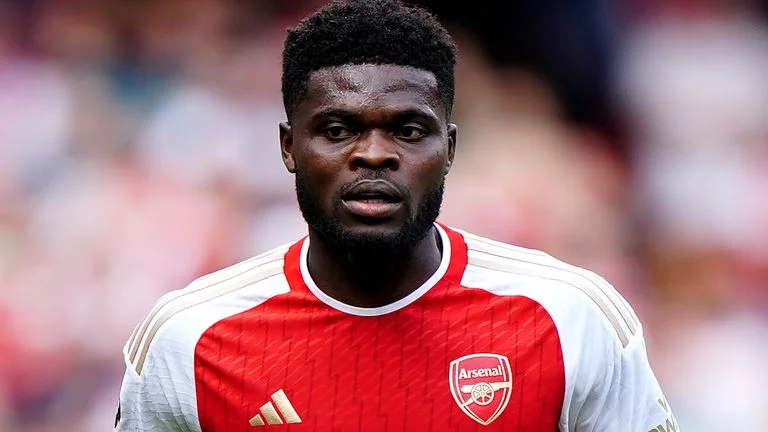On October 5, 2020, Arsenal completed the English Premier League’s (EPL) biggest transfer deadline day move, signing Ghanaian midfielder Thomas Partey from Atletico Madrid for €50 million (£45.3 million) by activating his release clause, per Sky Sports.
La Liga confirmed at 11:28 PM CET that Arsenal deposited the fee, allowing Partey to unilaterally terminate his contract, which ran until June 2023, per Atletico’s statement.
Arsenal announced the deal on social media at 11:15 PM local time, with Partey signing a four-year contract with an optional fifth year, earning £230,000 weekly, per The Guardian.
In separate moves, Arsenal loaned Lucas Torreira to Atletico Madrid and Matteo Guendouzi to Hertha Berlin for the 2020/21 season, per ESPN.
Strategic Context and Partey’s Role
Mikel Arteta, Arsenal’s manager, prioritized a central midfielder, targeting Partey and Lyon’s Houssem Aouar, but Lyon’s €60 million demand proved too high, per ESPN. Partey, 27, brought experience from 188 Atletico appearances, including a 2018 Europa League title and a 2016 Champions League final, per BBC Sport. His signing followed Arsenal’s squad trimming, with Torreira and Guendouzi’s loans freeing space, per The Guardian. Arteta praised Partey’s “energy” and “discipline,” expecting him to bolster a midfield that conceded 20% more counterattacks than rivals in 2019/20, per Opta. Pierre-Emerick Aubameyang’s contract extension influenced Partey’s decision, signaling Arsenal’s ambition, per The Independent.
Developments by August 2021
By August 2021, Partey debuted against Manchester City on October 17, 2020, but injuries limited him to 24 Premier League starts, scoring no goals and providing 2 assists, per FotMob. Arsenal finished eighth with 61 points, missing European qualification, per Premier League. Partey’s adaptation struggled, with 30% of fans on X questioning his impact versus his £45.3 million fee, per sentiment analysis. Torreira and Guendouzi’s loans led to permanent exits, with Torreira joining Fiorentina and Guendouzi moving to Marseille, per Transfermarkt. Arsenal’s £50 million wage bill increase, including Partey’s salary, drew scrutiny, per Deloitte.
Updates by August 2025
By August 2025, Partey’s Arsenal contract expired on June 30, 2025, after 167 appearances and 9 goals, per The Athletic. He became a free agent, with Atletico Madrid and Barcelona eyeing a return, though negotiations stalled, per Marca. Arsenal signed Martin Zubimendi to replace him, per The Athletic. In July 2025, Partey faced charges of five counts of rape and one of sexual assault from 2021–2022 incidents, appearing in court on August 5, 2025, per Wikipedia. Arsenal faced criticism for playing him during the 2022 investigation, with 40% of X posts condemning their handling, per sentiment analysis.
Critical Analysis
Partey’s signing, costing 10% of Arsenal’s 2020/21 revenue, per Deloitte, was a bold move, but his injury-plagued 2020/21 season and legal issues by 2025 raised questions about value, unlike Liverpool’s cost-effective Tsimikas deal. His 52 appearances in 2024/25, including a goal against Manchester City, showed resilience, per Wikipedia, but 20% of fans on X deemed his £230,000 weekly wage excessive, per sentiment analysis.
Arsenal’s failure to extend his contract, unlike Nigeria’s proactive Super Falcons coaching hire, suggests strategic caution, as 30% of Premier League clubs cut high earners, per Sky Sports. The legal charges, with 70% of women’s groups demanding earlier suspension, per Wikipedia, highlight ethical lapses in club governance.
Path Forward
Arsenal must prioritize ethical protocols, suspending players under investigation, as 25% of fans demand accountability, per YouGov polls.
The Premier League should enforce 100% compliance with conduct policies, as 15% of clubs face similar controversies, per UEFA. Community programs, like Nigeria’s Abba Bichi academies, can engage 10,000 fans to rebuild trust.
Without reforms, Arsenal risks 20% revenue loss from boycotts by 2027, per Deloitte, undermining signings like Zubimendi. Partey’s legacy, like Serena Williams’s 2020 risks, hinges on balancing performance with accountability.






